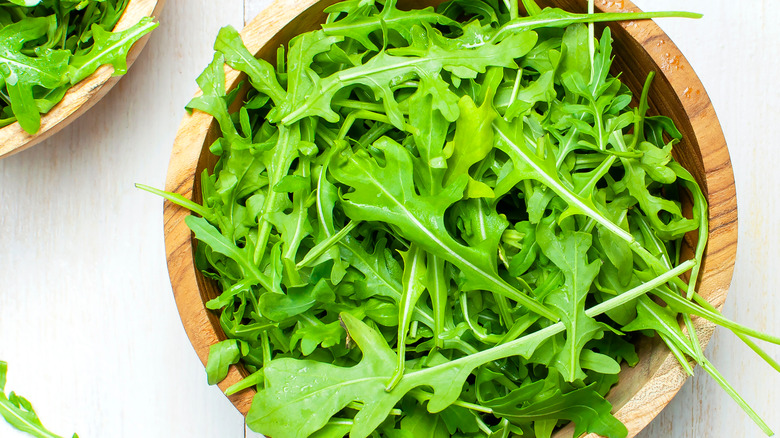What Is Arugula And What Does It Taste Like?
We may receive a commission on purchases made from links.
A salad is often disregarded as boring diet food or a sad side dish, but there are actually tons of different greens that can be used in a salad to add flavor and texture — one such veggie is arugula. Arugula — also known as rocket, roquette, or rucola — is a peppery crunchy green, with subtler flavors when it is cooked. Arugula was consumed by the Romans for its perceived healing properties and aphrodisiac qualities. Nowadays, you're more likely to find it as a base in a salad or as a pizza topping, never too far from its Mediterranean roots.
You'll notice that the level of pepperiness of arugula will vary, as will its appearance. According to FoodPrint, you should look for firm leaves lacking any signs of yellow. If you're still getting used to the peppery notes, the article suggests that bagged baby arugula will have a milder flavor. If you're looking for a lot of that pepperiness, though, FoodPrint suggests looking for "wild arugula."
Britannica places arugula in the Brassicaceae family, which includes cabbage, kale, and Brussels sprouts. These leafy vegetables are highly esteemed and considered to decrease the risk of cancer, cardiovascular disease, and premature mortality, according to a study in The International Journal of Epidemiology.
Why should you eat arugula?
Arugula is no different than its family members, and Healthline reports that it is packed with nutrients and phytochemicals. The site notes that the veggie is a great source of vitamin K, C, and A, as well as calcium, potassium, and folate. These nutrients are linked to bone health, blood pressure regulation, DNA production, immune function, muscle and nerve function, antioxidant activity, and organ function, according to Healthline. Arugula is also high in fiber and low in calories, making it a healthy addition to any dish.
The simplest way to use arugula is in a salad with some dressing, however, you'll find that its distinct flavor makes it a unique pairing with citrus fruits if you want a twist on the usual greens. Arugula is also a great substitute for basil and other herbs if you want to make pesto with a tangy bite. It is worth noting though that arugula wilts faster than other greens when heated, so MasterClass recommends adding it close to the end of the cooking time. Other options include tossing it into an omelet or adding it to a nice pasta for an extra kick. Whichever way you choose to add arugula to your plate, it won't go unnoticed!

